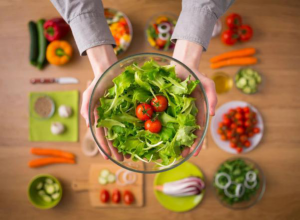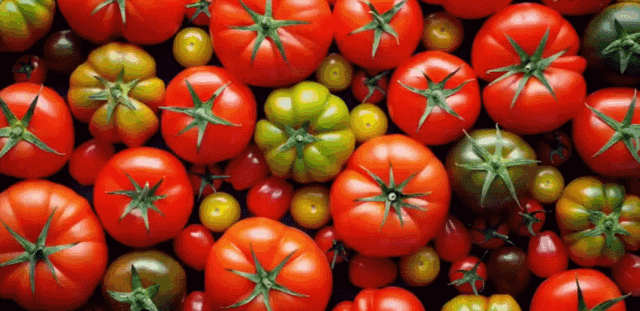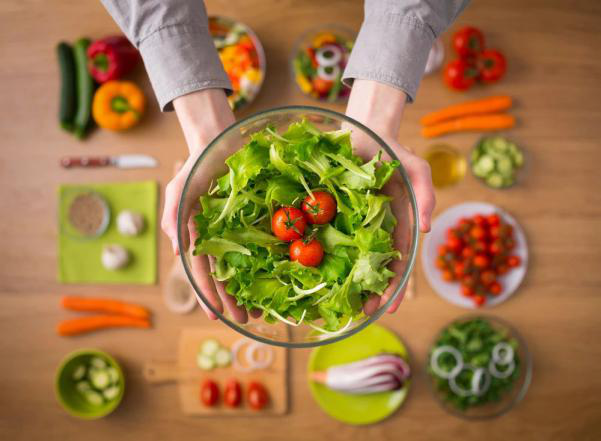
Once, “there is meat in the bowl” was a sign of prosperity. Nowadays, life is getting better and better, and more people are vegetarian. In the past 10 years, the global vegetarian population has increased by about 10%.
What will happen if you stick to a vegetarian diet for more than 100 days? Recently, a new study published by JAMA Network Open, a sub-issue of the Journal of the American Medical Association, gave a reference answer.

What happens if you stick to a vegetarian diet for more than 100 days?
This study was conducted by Dr. Kit Falk Peterson, an internal medicine expert at Yale University School of Medicine, and researchers from the school’s multiple departments. They evaluated 244 people with an average age of 54.4 years, overweight or obese ( Subjects with a body mass index (BMI between 28 and 40) were analyzed.
The subjects had no history of diabetes when they joined the study, did not smoke, were not during pregnancy or breastfeeding, and were not low-fat, vegan population.

According to the ratio of 1:1, the researchers randomly divided the subjects into an intervention group and a control group.
In the 16-week (112-day) follow-up study, participants in the intervention group were required to follow a low-fat, vegan diet based on fruits, vegetables, whole grains, and legumes, but did not limit their energy intake. 75% of the intake comes from carbohydrates, 15% from protein and 10% from fat, supplemented with vitamin B12; while the control group did not change their diet. The exercise and medication of the two groups of subjects also remained unchanged.

After adjusting for factors such as age and race, the researchers found that:
In just 16 weeks, adhere to a plant-based low-fat, vegan diet to promote postprandial metabolism in overweight or obese people, reduce body weight, insulin resistance, intramuscular and liver cell lipid levels, and improve metabolism There are multiple risk factors.
Specifically, the weight of subjects in the intervention group was reduced by an average of 6.4 kg, while the control group was only 0.5 kg;
The total cholesterol and low-density lipoprotein cholesterol (“bad” cholesterol) levels of the intervention group decreased by 19.3 mg/dL and 15.5 mg/dL, respectively, while the control group decreased by 3.9 mg/dL and 2.7 mg/min, respectively Rise, no significant change;
The fasting plasma insulin concentration of subjects in the intervention group decreased by 21.6 picomoles/liter, the predicted insulin sensitivity index increased significantly by 0.9, insulin resistance decreased, and insulin sensitivity increased, while the control group did not change significantly.
Dr. Hana Kahleova, the corresponding author of the study and the Director of Clinical Research of the American Board of Responsible Medical Physicians, said: “A low-fat, vegan diet not only loses weight, but also improves cardiometabolism, which will also reduce their risk of heart disease and other health problems.”
Vegetarians should prevent nutrient deficiency
Generally speaking, a vegetarian diet refers to a diet that does not eat meat, poultry, seafood and other animal foods. Vegetarians are usually divided into two types:
Do not eat meat, but eat egg and milk ovo-lacto vegetarian (or eat eggs but not dairy products, or eat dairy products but do not eat eggs);
A vegan who does not eat animal food at all.

Vegetarian foods are mainly grains, mixed beans, soybeans and their products, vegetables, etc. Such foods are rich in dietary fiber, plant compounds, etc., which are closely related to human health.
However, from the perspective of nutrition, vegetarians are prone to lack some nutrients that are very important to the human body.
Iron deficiency
The main food sources of iron are animal blood, liver, and lean meat. The iron in it is heme iron, which has a high absorption and utilization rate; while black fungus, laver, and mushrooms have high iron content, they are mainly non-heme iron, which is absorbed and utilized The rate is low.
Vitamin C helps the absorption and utilization of non-heme iron in the human body. It is recommended that vegetarians eat more fruits and vegetables rich in vitamin C, such as green peppers, fresh dates, strawberries, and kiwis.
Vitamin B12 deficiency
This vitamin can nourish nerves, and lack of it can easily cause megaloblastic anemia and increase the risk of cardiovascular and cerebrovascular diseases. Vitamin B12 is mainly found in animal foods, fermented foods and fungus foods. Unfermented plant foods hardly contain such nutrients.
It is recommended that vegans add fermented soy products in their diet, such as natto, fermented bean curd, and tempeh, as well as supplements and fortified foods.
Calcium deficiency
As long as the egg-milk vegetarians ensure the intake of dairy products, soybeans and green leafy vegetables, they will basically not lack calcium; vegans do not eat dairy products and need to eat other calcium-rich foods, such as shredded tofu, dried tofu, and yuba , Leafy vegetables, etc.
At the same time, pay attention to outdoor activities, promote the synthesis of vitamin D, increase the absorption and utilization of calcium, and take calcium preparations when necessary.
Zinc deficiency
For vegans, the risk of zinc deficiency is higher than that of ovo-milk vegetarians. Polished rice, vegetables, and fruits have lower zinc content, but nuts and whole grains are good sources of zinc, such as black sesame seeds and pine nuts.
Fermented soy products are also a good source of zinc. Vegetarians, especially vegans, can appropriately increase their intake of these foods.
Lack of high quality protein
Cereals, vegetables, fruits, bacteria and algae, beans and their products are all important sources of protein for vegetarians. However, cereals, fungi and algae, especially vegetables and fruits, have low protein content and are likely to cause a lack of high-quality protein.
It is recommended that vegetarians increase their intake of legumes and their products, and eat them with cereals.
Generally speaking, compared to vegans, egg-milk vegetarians are easier to maintain nutrient balance, but the iron absorption rate is relatively low, so attention should be paid to prevent iron deficiency anemia.
In addition to paying attention to iron supplements, vegans should also take care to prevent the lack of high-quality protein, zinc, vitamin B12 and other nutrients, and develop a scientific diet to ensure a balanced nutrition.
Be a vegetarian, remember 5 “key points”
For vegetarians to eat healthily, the key lies in scientific collocation. In order to meet nutritional needs, vegetarians may wish to adhere to the following dietary principles.

01. Grain-based, food diversified
Cereals are the main source of energy for vegetarians. They can provide carbohydrates, B vitamins, minerals and dietary fiber. Whole grains are richer in nutrients and should be increased in appropriate amounts. Vegetarians should not have a partial eclipse. They should consume at least 12 types of food every day and at least 25 types of food a week.
02. 50~80g soybeans per day, choose fermented soy products
Soybeans are rich in high-quality protein, unsaturated fatty acids, and B vitamins. If you have a cup of soy milk for breakfast, soybean sprouts for lunch, and stewed tofu or fried tofu for dinner, you can easily eat to the recommended standard.
The combination of soy foods and grains can play a complementary role in protein and significantly improve nutrition. For example, pasta made with a mixture of corn flour, millet flour, and soy flour is as nutritious as pork.

03 often eat nuts, seaweed and mushrooms
Nuts are rich in protein, unsaturated fatty acids, vitamin E, B vitamins, calcium, iron, etc. Regular eating is good for heart health.
Algae contains more n-3 polyunsaturated fatty acids; mushrooms are rich in minerals and fungal polysaccharides, which can be an important source of vitamins and minerals for vegetarians.
Vegans should eat 20-30 grams of nuts and 5-10 grams of algae or mushrooms every day. The ovo-lacto vegetarian population consumes 15-25 grams of nuts a day.
04 Adequate intake of vegetables and fruits
Vegetarians eat the same amount as the general population, that is, ensure that there are vegetables in the meal, with a daily intake of 300-500 grams, with dark vegetables accounting for half; eating fruits every day, daily intake of 300-350 grams, can not be replaced by fruit juice.
05 Reasonable choice of vegetable cooking oil
If vegetarians eat oil improperly, it is easy to lead to insufficient intake of omega 3 fatty acids. Linseed oil (flax oil), perilla oil, rapeseed oil, and soybean oil are all rich in α-linolenic acid, which is one of the components of omega 3 fatty acids.
It is recommended to use rapeseed oil or soybean oil for stir-frying, linseed oil or perilla oil for cold dressing, and to fry foods with a blend.
Simple and easy to remember
Iron: eat more spinach, black fungus, etc.; fruits and vegetables rich in vitamin C help the absorption of plant iron; wok cooking.
Zinc: Eat more beans, whole grains, nuts, and mushrooms.
Vitamin B12: Eat more fermented soy products, mushrooms, and vitamin B12 supplements if necessary.
Calcium: Eat more green vegetables such as broccoli, almonds, and tofu; people with ovo-lacto-lacto and lacto-vegetables eat more dairy products.
Vitamin D: Eat fortified cereals to ensure that you are in the sun every day.
n-3 polyunsaturated fatty acids: eat linseed oil, perilla oil and some seaweed.
Comments